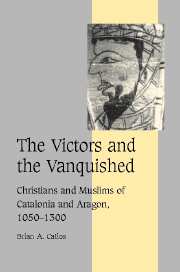Book contents
- Frontmatter
- Contents
- List of figures
- List of maps
- List of tables
- Acknowledgments
- Note on the citation of sources, dates, places, and names
- Glossary
- List of abbreviations
- INTRODUCTION
- Part I Muslim domination of the Ebro and its demise, 700–1200
- Part II Muslims under Christian rule
- INTRODUCTION
- 3 THE FINANCIAL AND JUDICIAL ADMINISTRATION OF MUDÉJAR SOCIETY
- 4 MUSLIMS IN THE ECONOMY OF THE CHRISTIAN EBRO
- 5 MUDÉJAR ETHNICITY AND CHRISTIAN SOCIETY
- 6 MUSLIMS AND CHRISTIAN SOCIETY
- MUDEJARISMO AS A SOCIAL SYSTEM
- Part III INDIVIDUAL AND COMMUNITY IN THE CHRISTIAN EBRO
- Conclusions
- Appendices
- Select bibliography
- Index
- Cambridge Studies in Medieval Life and Thought Fourth series
MUDEJARISMO AS A SOCIAL SYSTEM
Published online by Cambridge University Press: 08 January 2010
- Frontmatter
- Contents
- List of figures
- List of maps
- List of tables
- Acknowledgments
- Note on the citation of sources, dates, places, and names
- Glossary
- List of abbreviations
- INTRODUCTION
- Part I Muslim domination of the Ebro and its demise, 700–1200
- Part II Muslims under Christian rule
- INTRODUCTION
- 3 THE FINANCIAL AND JUDICIAL ADMINISTRATION OF MUDÉJAR SOCIETY
- 4 MUSLIMS IN THE ECONOMY OF THE CHRISTIAN EBRO
- 5 MUDÉJAR ETHNICITY AND CHRISTIAN SOCIETY
- 6 MUSLIMS AND CHRISTIAN SOCIETY
- MUDEJARISMO AS A SOCIAL SYSTEM
- Part III INDIVIDUAL AND COMMUNITY IN THE CHRISTIAN EBRO
- Conclusions
- Appendices
- Select bibliography
- Index
- Cambridge Studies in Medieval Life and Thought Fourth series
Summary
Arabo-Islamic society in the Ebro region survived the trauma of the Christian conquest and persevered through the twelfth and thirteenth centuries owing to its own adaptability and to the high degree to which Christian society was prepared and obliged to accept its maintenance and integration. Like a square peg rammed into a round hole, the Islamic society of the Ebro endured – not without drastic changes to its outward manifestations, but preserving its essence and identity in important senses. Historians who focus only on one or two elements of the pre-conquest society, such as irrigation or settlement patterns, may be led to deduce that it was destroyed by the Christian conquest, but such a conclusion can only result from an conceptual over-simplification of what composes a society, and of its reduction to these elements. Consider the indigenous American societies, which underwent traumas far more profound than that of the Muslims of the Ebro; it is obvious that they were radically transformed in terms of settlement, production, and social class, but it would hardly be accurate to say that they “came to an end.”
Certain Islamic institutions persisted after the Christian conquest of the Ebro, and others did not; those which remained were transformed, sometimes to such a degree that they survived only in name. The conjunction of Christian and Islamic administrative systems, wholly foreign to each other, from their philosophical underpinnings through to their structures and protocol forced Muslims to adjust native systems and learn to move within Christian ones.
- Type
- Chapter
- Information
- The Victors and the VanquishedChristians and Muslims of Catalonia and Aragon, 1050–1300, pp. 323 - 324Publisher: Cambridge University PressPrint publication year: 2004



